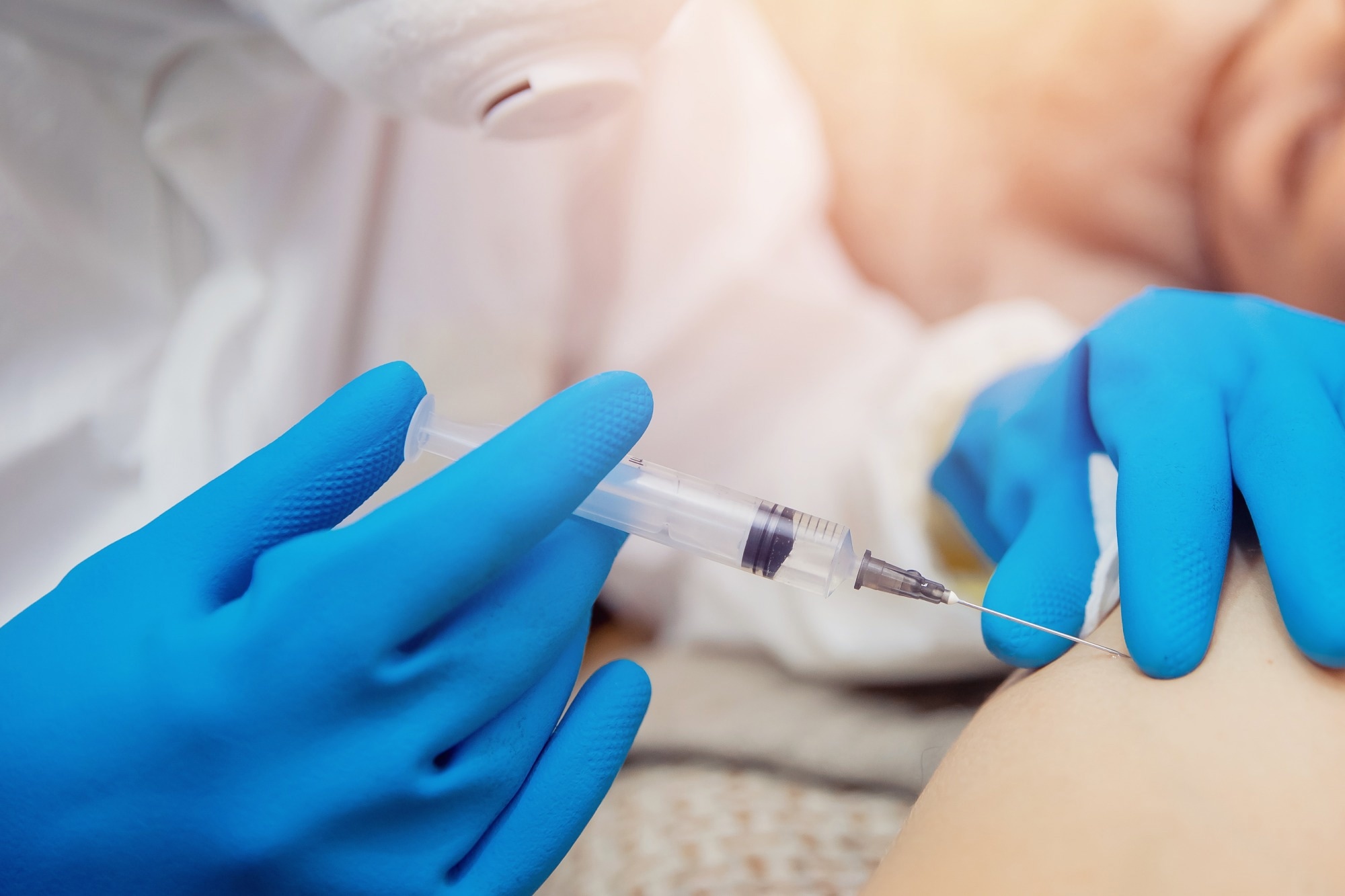In a recent study posted to the bioRxiv* preprint server, researchers at Beth Israel Deaconess Medical Center assessed the immunogenicity associated with severe acute respiratory syndrome coronavirus 2 (SARS-CoV-2) BA.5 bivalent messenger ribonucleic acid (mRNA) vaccine boosters.
The effectiveness of the mRNA vaccine against symptomatic as well as severe disease has decreased due to the emergence of novel SARS-CoV-2 variants. Since BA.5 is currently the most prevalent SARS-CoV-2 variant that significantly evades neutralizing antibodies, bivalent mRNA boosters encoding the ancestral SARS-CoV-2 WA1/2020 and Omicron BA.5 spike (S) proteins have been created and approved. However, the immunogenicity of bivalent mRNA boosters incorporating BA.5 is still unknown.
 Study: Immunogenicity of the BA.5 Bivalent mRNA Vaccine Boosters. Image Credit: Parilov / Shutterstock
Study: Immunogenicity of the BA.5 Bivalent mRNA Vaccine Boosters. Image Credit: Parilov / Shutterstock

 This news article was a review of a preliminary scientific report that had not undergone peer-review at the time of publication. Since its initial publication, the scientific report has now been peer reviewed and accepted for publication in a Scientific Journal. Links to the preliminary and peer-reviewed reports are available in the Sources section at the bottom of this article. View Sources
This news article was a review of a preliminary scientific report that had not undergone peer-review at the time of publication. Since its initial publication, the scientific report has now been peer reviewed and accepted for publication in a Scientific Journal. Links to the preliminary and peer-reviewed reports are available in the Sources section at the bottom of this article. View Sources
About the study
In the present study, researchers assessed the cellular and humoral immune responses of individuals vaccinated with the original monovalent mRNA boosters and those vaccinated with the bivalent mRNA boosters.
Following Pfizer or Moderna bivalent mRNA boosting, individuals' neutralizing antibody (NAb) titers were measured using luciferase-based pseudovirus neutralization tests. Enzyme-linked immunosorbent assay (ELISA) assays measuring binding antibody titers in individuals after monovalent or bivalent mRNA booster vaccination were also performed. Additionally, electrochemiluminescence (ECLA) tests for measuring binding antibody titers in individuals after boosting with monovalent or bivalent mRNA were conducted.
Results
Despite the possibility that most participants had developed hybrid immunity before receiving the booster vaccination due to the high incidence and mild severity of SARS-CoV-2 Omicron infection, participants had a median of three prior SARS-CoV-2 vaccination doses, while 33% had verified SARS-CoV-2 infection during the Omicron spike. The monovalent and bivalent mRNA boosters elicited the preferential increase of WA1/2020 NAb titers while decreasing the BA.1, BA.2, and BA.5 NAb titers. After monovalent mRNA boosting, median BA.5 NAb titers grew from 184 to 2829, while the titers after bivalent mRNA boosting increased from 211 to 3693. Similar NAb profiles were noted for the bivalent mRNA boosters developed by Pfizer and Moderna. After boosting with monovalent and bivalent mRNA vaccines, binding antibody responses found via electrochemiluminescence assay and ELISA were comparable.
A slight increase was noted in the SARS-CoV-2 spike-specific CD8+ and CD4+ T cell responses after boosting with monovalent and bivalent mRNA vaccines. Furthermore, after monovalent and bivalent mRNA boosting, median BA.5 CD8+ T cell responses rose from 0.027% to 0.048% and from 0.024% to 0.046%, respectively. On the other hand, median BA.5 CD4+ T cell responses improved after monovalent mRNA boosting from 0.060% to 0.130% and after bivalent mRNA boosting from 0.051% to 0.072%. After monovalent and bivalent mRNA boosting, the median BA.5 memory B cell responses were 0.079% and 0.091%, respectively.
Conclusion
The study findings showed that monovalent and bivalent mRNA boosters significantly elevated antibody responses but not T-cell responses. After monovalent and bivalent mRNA boosters vaccinations, BA.5 NAb titers were found to be equivalent, with a slight and non-significant trend supporting the bivalent booster. The researchers believe that immunological imprinting due to prior antigenic exposure may present a greater difficulty in generating robust immunity against SARS-CoV-2 variants than currently acknowledged.

 This news article was a review of a preliminary scientific report that had not undergone peer-review at the time of publication. Since its initial publication, the scientific report has now been peer reviewed and accepted for publication in a Scientific Journal. Links to the preliminary and peer-reviewed reports are available in the Sources section at the bottom of this article. View Sources
This news article was a review of a preliminary scientific report that had not undergone peer-review at the time of publication. Since its initial publication, the scientific report has now been peer reviewed and accepted for publication in a Scientific Journal. Links to the preliminary and peer-reviewed reports are available in the Sources section at the bottom of this article. View Sources
Journal references:
- Preliminary scientific report.
Immunogenicity of the BA.5 Bivalent mRNA Vaccine Boosters, Ai-ris Collier, Jessica Miller, Nicole Hachmann, Katherine McMahan, Jinyan Liu, Esther Bondzie, Lydia Gallup, Marjorie Rowe, Eleanor Shonberg, Siline Thai, Julia Barrett, Erica Borducchi, Emily Bouffard, Catherine Jacob-Dolan, Camille Mazurek, Audrey Mutoni, Olivia Powers, Michaela Sciacca, Nehalee Surve, Haley VanWyk, Cindy Wu, Dan Barouch bioRxiv 2022.10.24.513619, DOI: https://doi.org/10.1101/2022.10.24.513619, https://www.biorxiv.org/content/10.1101/2022.10.24.513619v1
- Peer reviewed and published scientific report.
Collier, Ai-ris Y., Jessica Miller, Nicole P. Hachmann, Katherine McMahan, Jinyan Liu, Esther A. Bondzie, Lydia Gallup, et al. 2023. “Immunogenicity of BA.5 Bivalent MRNA Vaccine Boosters.” New England Journal of Medicine, January. doi.org/10.1056/NEJMc2213948. https://www.nejm.org/doi/10.1056/NEJMc2213948.